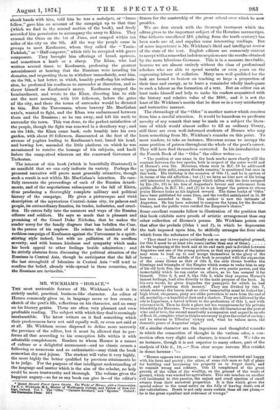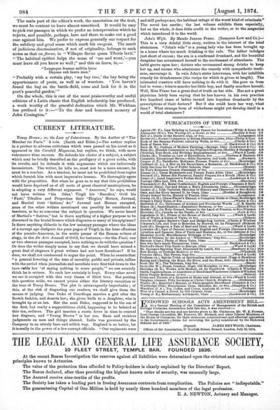MR. WICKH A M'S " HORACE."* "Pm most noticeable feature
of Mr. Wickham's book is its strictly useful, practical, business-like character. An editor of Horace commonly gives us, in language more or less ornate, a sketch of the poet's life, reflections on his character, and an essay on his literary genius. These are often very pleasant and even profitable reading. The subject with which they deal is seemingly inexhaustible. The latest writers on it find something which their predecessors have not said equally well, or even not said at at all. Mr. Wickham seems disposed to define more narrowly the province of the editor, but it must bq allowed that he per- forms all that according to his conception falls within it with admirable completeness. Readers to whom Horace is a means of culture or a delightful amusement—and no classic counts a following so numerous and so enthusiastic—may think the book somewhat dry and jejune. The student will value it very highly, the more highly the better qualified by previous attainments he is to judge. For the purpose of that intelligent understanding of the language and matter which is the aim of the scholar, no help could be more trustworthy and thorough. The volume gives the happiest augury—so far as any book can give it—of the editor's • -Quist{ Horatii Flacci Opera °mita. The Works of Horace, with a Commentary. Py 5.0. Wickham, ILA, Blaster of Wellington College, and Fellow of New Col- lege, Oxford. Vol. 1. The .'Odes," "Carmen Seculare," and "Epode." Oxford: the Otareackin Press. 1874
fitness for the mastership of the great school over which he now presides.
We are first struck with the thorough treatment which the editor gives to the important subject of the Horatian manuscripts. One hitherto uncollated MS. (dating from the tenth century) has been made use of, and supplies some interesting readings. But of more importance is Mr. Wickham's lftcid and intelligent review of the state of the text. English editors are commonly content to accept with a somewhat indolent acquiescence the results obtained by the more laborious Germans. This is in a measure inevitable, because we are almost entirely without the class of professional scholars who are able to spend months or even years on the engrossing labour of collation. Many men well qualified for the task are bound to bestow on teaching so large a proportion of their time and energy, as to leave a remainder wholly inadequate to such a labour as the formation of a text. But an editor can at least make himself and help to make his readers acquainted with the history and relative value of the MSS., and it is not the least of Mr. Wickham's merits that he does so in a very satisfactory and instructive manner.
The chronology of the "Odes" is another matter which receives from him a careful attention. It would be hazardous to predicate novelty of any remark that may be made on a subject the litera- ture of which would almost suffice to fill an ordinary library, still there are even well-informed students of Horace who may learn something from Mr. Wickham's remarks on this point. To most readers, to take an instance, Mmcenas seems to occupy the same position of patron throughout the whole of the poet's career. They will here find themselves corrected. In his introduction to the Fourth Book of the "Odes" the editor writes
The position of one name in the book marks more clearly still the contrast between the two epochs, both in respect of the outer world and of Horace's own life. Maecenas, whom even in B.C. 19 he addressed as 'prima dicta mihi, summa dicende canuina,' is mentioned but once in this book. His birthday is the occasion of Ode 11, and he is spoken of in terms of the old affection ; but (1) we have no hint now of his being still interested in politics, a change which tallies, with the date assigned by Dio (liv. 19) to his loss of Augustus's favour and retiremont from public affairs, in B.C. 16; and (2) he is no longer the patron to whose praise Horace looks as his highest reward. The three books of 'Odes' have been published for some time, and the verdict anticipated in iii. 30 has been accorded to them. The author is now the intimate of Augustus. He has been selected to compose the hymn for the Secular Games, and the public voice ratified the Emperor's choice."
Some excellent remarks follow in illustration of the position that this book exhibits more proofs of artistic arrangement than any other collection of Horace's poems. Mr. Wickham points out that after the prelude (Odes 1 and 2), in which he deprecates the task imposed upon him, he skilfully arranges the four odes which form the substance of the book :—
" They stand in two pairs (evidently not on any chronological ground, for Ode 6 must be at least two years earlier than any of them) At the beginning of the book and at its end each pair is divided between Augustus and one of the young princes, so that any praises of the latter may seem to lead up to and merge themselves in the glory of the former The middle of the book is occupied with the expansion of the same theme as that of Ode 3, the only theme besides the blessings and triumphs of the Empire which seems to wake him to any of his old lyric fire, the consciousness of his own poetio power, end the immortality which he can confer on others, as he has secured it for himself. Odes 6, 8, and 9, like Ode 3, while they express Horace's inmost feelings, lead also directly to the main purpose of the book. In his own words, he gives Augustus the panegyric for which he had asked, and pretium dicit muneri.' They are divided by Ode 7, which enforces the lesson that no other immortality must be looked for ; high blood, eloquence, piety are alike powerless to save from the end of all, mortality,—a handful of dust and a shadow. They are followed by the ode to Ligurinus, a forced tribute to the professions of Ode 1, and with reference to it. Then he finds a place not too conspicuous for his private friendship for Manenas. Two more odes in his old character as the poet of wine and of love, the second manifestly a companion and sequel to an ode of Book iii., complete what he thinks necessary to give the relief of variety; and he returns to Tiberius' victory and, what he values more, the domestic peace of Augustus' reign.'
Of a similar character are the ingenious and thoughtful remarks in which the connection of thought in the various odes, a con- nection often very slight and obscure, is traced out. We take as an instance, though it is not superior to many others, part of the analysis of Ode ii., 18,—" Non ebur neque aureum Mea renidet in domo lacunar : "— "Horace opposes two pictures: one of himself, contented and happy with his farm and poetry ; the other, of some rich man so full of plans for building and increasing his property as to forget death, and to commit wrong and robbery. Ode 16 complained of the great growth of the villas of the wealthy, on the ground of the waste of ground, which was wanted for agriculture. This ode touches on another evil incidental to this passion, the unjust and cruel ejection of small owners from their ancestral properties. It is this which gives the special colour to the usual satire on the folly of leaving death out of our calculations. Death is not only more certain than all our plans,— he is the great equaliser and redresser of wrongs."
The main part of the editor's work, the annotation on the text, we must be content to leave almost unnoticed. It would be easy to pick out passages in which we prefer an interpretation which he rejects, and possible, perhaps, here and there to make out a good case against him. We prefer to express generally our respect for the subtlety and good sense which mark his exegesis. The merit of judicious discrimination, if not of originality, belongs to such notes as that on flavus, in " Villaque flavus quam Tiberis lavit." "The habitual epithet helps the sense of use and wont,'—you must leave all you know so well ;" and this on /auru, in,— "Longaque fessum militia lotus Depone sub laurn mea."
"Probably with a certain play, 'my bay tree,' the bay being the appurtenance of poets, as well as of warriors. You haven't found the bay on the battle-field, come and look for it in the poet's peaceful garden."
On the whole, this is one of the most praiseworthy and useful editions of a Latin classic that English scholarship has produced, a work worthy of the graceful dedication which Mr. Wickham has prefixed to it :—" To the dear and honoured memory of John Conington."































 Previous page
Previous page